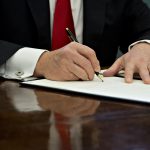I’m a Muslim woman of color living in diverse New York City, but the part of the city I live in is predominantly conservative. As a visible minority, I have never felt particularly welcomed by some of my neighbors. But up until recently, I was comforted by the fact that if the hostility expressed toward me escalated, I could at least take refuge in the law — that no matter my religion or my skin color or my choice of dress, the protections afforded by the rule of law would provide some measure of safety, or at least accountability.
When kids on their bikes surrounded my car and yelled for my family and me to go back to our country, I felt reassured that the law could provide justice; that I could call the police and seek recourse if I chose to. When a man intentionally drove straight at me while I was walking home, swerving away only at the last minute, I felt reassured that the law would call that a crime, that my concerns would be taken seriously by police and others whom the law instructs to safeguard the public.
What’s more, I work at Physicians for Human Rights (PHR), an organization that uses the power of evidence to fight for justice and accountability. I work with some of the brightest medical and legal minds in the country. They’ve continually inspired me to have faith in the law and in the power of truth.
But the election of Donald Trump changed the equation. Daily, I saw signs that some of his most ardent supporters in my neighborhood felt emboldened — while I felt more and more vulnerable. When I called my local police precinct to inquire about the process to report a hate crime, the operator responded with skepticism. I was no longer sure that the law would protect me from the bigotry I saw growing all around me.
At the time, I believed that while the president might be able to significantly change policies, he could not change the fact that there was a functioning system in this country that would prevent the deterioration of our rights and liberties. No one president alone, I thought, can change the law or the U.S. Constitution.
After hearing about the president’s executive order on immigration and refugees last month, I tried to escape reality in a futile effort of self-preservation. For 48 hours, I avoided social media and news shows and websites. Then, I finally broke down and read the executive order. I didn’t know whether to laugh or cry. It was both absurd and cruel at the same time — and it hit horribly close to home.
I am the daughter of Palestinian refugees. In 1948, when the state of Israel was created, my father was uprooted from his home in Jaffa and forced into a refugee camp. At five years old, he witnessed soldiers killing his classmates and continues to have nightmares until this very day.
I was lucky enough to be born in the United States, not the war-torn battlefield of my parents’ homeland, and today, I work to help people like my father. As a staffer in PHR’s asylum program, I help refugees and immigrants secure evidence of the torture, sexual violence, and other abuse that they suffered in their countries of origin. We match immigration attorneys with doctors and other health professionals from around the country who evaluate the physical and psychological scars of their clients. These evaluations help bolster the client’s case to stay in the United States.
I do this work because the people who flee from war, poverty, and domestic violence deserve the same right to pursue happiness that my family now has. I do this work because the trauma that people like my father have faced deserves to be documented and used to support their claims to seek refuge here.
But it seems the president doesn’t agree. He believes refugees and those fleeing persecution may “engage in acts of bigotry or hatred” — that’s his rationale for turning his back on the promise this country once made to my family: that here in the United States, the law and the rule of law will protect you.
So it leaves me with two options. Give up. Or keep fighting. This executive order will only encourage more attacks against the people on whose behalf I work — people like me. But I will not be intimidated. For all those seeking a safe haven, I’m ready to keep working and keep fighting.

